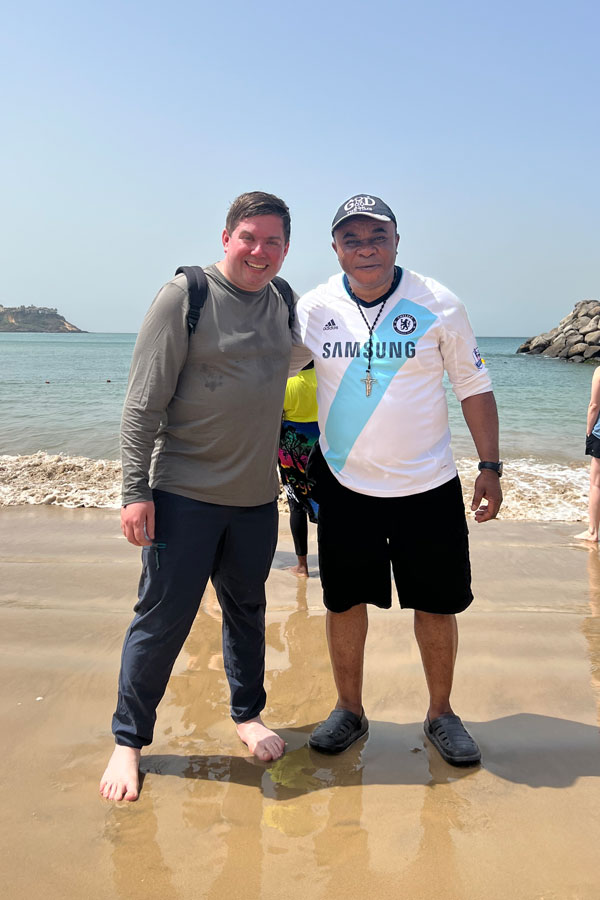Fulbright-Hays trip broadens faculty perspective
Professors return from West Africa with insights that reshape how they teach

Two Pitt-Bradford professors were among a select group of scholars chosen for a U.S. State Department Fulbright-Hays program in West Africa this summer, an experience that is already reshaping how they teach their students this fall.
Dr. Drew Flanagan, assistant professor of history, and Dr. Obinna Ezeihuoma, assistant professor of criminal justice, traveled with a dozen other University of Pittsburgh scholars to Senegal and the Gambia. Senegal is the westernmost country in Africa, and it nearly surrounds the Gambia, a skinny country consisting of land along either side of the Gambia River.
The program was organized by Pitt’s Center for African Studies, which supports cultivating a new generation of scholars, experts and leaders with an understanding of this important region in the world. Funds for the program came from the Fulbright-Hays Group Projects Abroad.
The group spent about half of its time in structured cultural learning, which included studying the basics of Wolof — the most widely spoken of Senegal’s 30 languages — along with dancing, sampling local specialties, enjoying traditional music, visiting a church and mosque, experiencing Senegalese hospitality, and exploring historical and natural sites such as those tied to the slave trade, the desert region and the pink lake.
There are plenty of reminders of colonialism in Senegal, which is about the size of Nebraska. While based in the capital of Dakar, the scholars traveled to other cities, including Saint Louis on the edge of the Sahara and Banjul and Serekunda in the Gambia.
Before European colonization, Senegal was home to powerful kingdoms between the 6th and 14th centuries, including the Jolof Empire. The Portuguese arrived first, followed by the French.
In 1677, France took over the island of Gorée a mile off the coast, which had been a hub of the slave trade. Senegal was a French colony until 1960. For Flanagan, who studies European colonial empires and their connection to the modern era, the chance to visit a former French colony was enticing. He is already weaving his new insights into one of his fall courses, Colonial Empires in the Modern World.
Flanagan said that while he had studied French colonialism, visiting Senegal and Gambia gave him a more nuanced understanding and a new perspective.
“Something became real for me that hadn’t been before from experiencing the texture of life there. It has a real emotional resonance,” he said. “Now everything is more complicated than I realized before. When you spend time in other cultures, you are changed by it, and your world expands mentally and physically.”
Flanagan said he noticed that the citizens’ attitude toward the colonial period now seems to be in flux following the election of a new president last year.
“I went in with very few preconceptions,” he said. “I was struck by how much the country has changed very recently. There is a real sense of pride. It made me think about how much I have to learn.”
Ezeihuoma, a native of Nigeria, was also struck by how different Senegalese culture was from his own. The two capitals — Lagos and Dakar — might look close on a map, but they are more than 2,000 miles apart.
In Nigeria, Ezeihuoma noted, religion is often politicized and exploited by extremist groups such as Boko Haram. In contrast, Senegal’s Sufi traditions and commitment to interfaith tolerance foster peace, social cohesion and democratic stability.
“There is a harmony that exists,” he said. “In other parts of West Africa that is not the case.” As a scholar interested in terrorism, he noticed how the influence of Islam was different in Senegal and even took his first trip to a mosque.
As a criminologist, Ezeihuoma was also interested in juvenile justice. He said that juvenile crimes in Senegal, just like in some other African countries, are managed by the community and family. His background is in juvenile justice, a field he entered through his work as a high school teacher, juvenile supervision officer and parochial vicar in Catholic communities in the United States and Nigeria.
“It is a different way of seeing how people relate to each other and the state,” he said.
For Ezeihuoma, the most powerful moment was standing at the ‘point of no return’ on Gorée Island, a UNESCO World Heritage Site and hub of the slave trade. Raised in Africa, he had not experienced slavery as a personal marker of identity. He said that his visit to the 'point of no return' evoked a deeper reflection and improved his understanding of his Black American students and colleagues.
“It gives me the history of some of our brothers and sisters without a Western lens,” he said.
While they got to know Senegalese people, Flanagan and Ezeihuoma also got to know each other and their fellow Pitt companions while eating traditional communal meals and enjoying a hospitality that extends kindness and generosity to strangers.
“Everyone should experience being in a place where they are not in charge,” Flanagan said. “It makes you think about everything differently.”
Ezeihuoma agreed: “Everything we teach has a Western mentality about it.” Both professors return to their classrooms this fall with a broader worldview and new insights to share with their students.
--30--